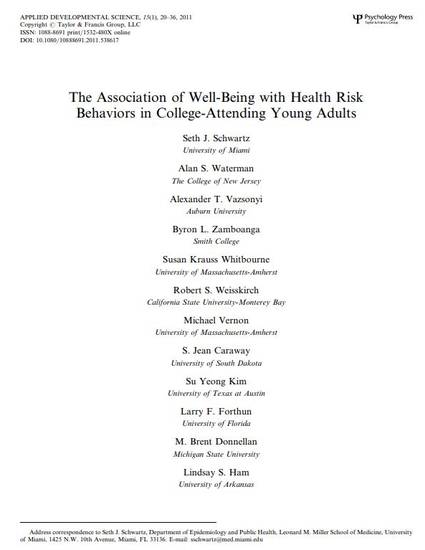
Article
The Association of Well-Being with Health Risk Behaviors in College-Attending Young Adults.
Applied Developmental Science
(2011)
Abstract
The present study investigated the associations of well-being with engagement in illicit drug use, sexual risk taking, and impaired driving in a sample of 9,515 students from 30 U.S. colleges and universities. Participants completed measures of subjective well-being, psychological well-being, and eudaimonic well-being, and indicated how many times in the past 30 days that they had engaged in several illicit drug use, sexual risk, and impaired driving behaviors. Findings indicated that well-being was negatively associated with incidence of illicit drug use and some sexual risk behaviors, but not with incidence of drunk/drugged driving or riding with an impaired driver. Well-being was negatively related to frequency of casual sex, sex while drunk/high, drunk/drugged driving, and riding with an impaired driver. Associations of well-being were strongest for more dangerous types of drug use and sexual behavior and for riding with an impaired driver. Results are discussed in terms of implications for research and intervention development.
Disciplines
- Psychiatry and
- Psychology
Publication Date
2011
DOI
10.1080/10888691.2011.538617
Citation Information
Seth J. Schwartz, Alan S. Waterman, Alexander T. Vazsonyi, Byron L. Zamboanga, et al.. "The Association of Well-Being with Health Risk Behaviors in College-Attending Young Adults." Applied Developmental Science Vol. 15 Iss. 1 (2011) p. 20 - 36 Available at: http://works.bepress.com/rob-weisskirch/30/
